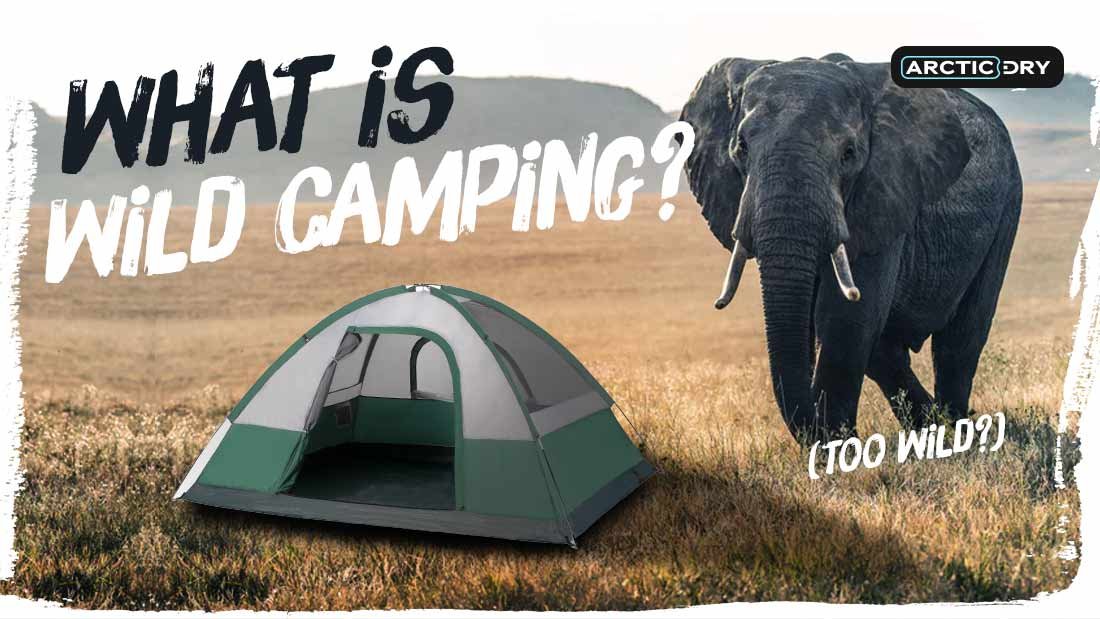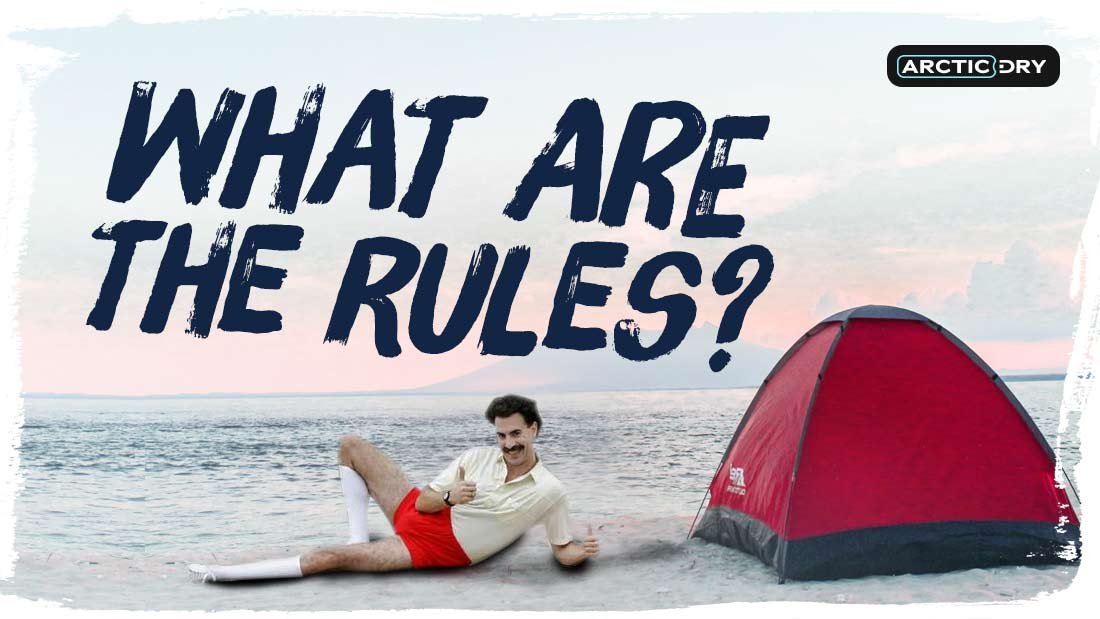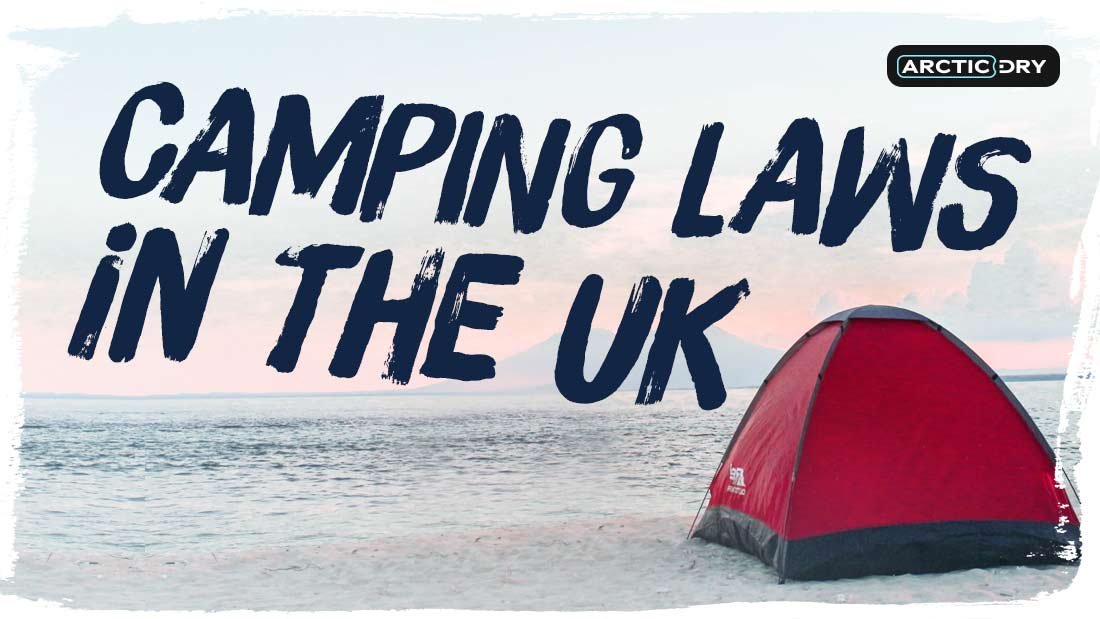Is Wild Camping Illegal in the UK?

Contents
Wild Camping has taken the UK by storm, especially since the Corona Crisis, people are craving the great outdoors and the ability to just grab your Tent, Sleeping Bag & Jetboil and go camp out in the wild.
However, here in the UK things tend to work a bit differently in terms of land laws and where you’re allowed to pitch your tent legally.
Whilst Wild Camping is super popular and it will only continue to go from strength to strength, you still need to be aware of where you can and can’t go.
So, why is it illegal to Wild Camp? Lets start with a basic definition.
What is Wild Camping?

Wild camping is the simple act of camping in the wilderness, as opposed to pitching your tent on a more traditional camping / caravanning site.
Essentially, wild camping is all about skipping the crowds and heading into the depths of the empty, silent, and vast wilderness to spend some true alone time.
Now, for some Wild Camping is just an excuse to grab a 6 pack of BrewDog IPA and get smashed, but listen closely: The UK is dam cold, and if you don’t have the correct camping gear, how else are you going to keep warm eh? 😉
Wild Camping in the UK
As entertaining as wild camping sounds, there are specific rules governing the practice that might rob people of their fun in the wilderness (Fun in the wilderness, not to be confused with other, more lewd activities we practice here in the UK)
This is because wild camping is generally illegal in the UK, except for a few areas of the territory.
These rules are basically split between Scotland and the other parts of the UK.
In short, Scotland is the only area of the country that effectively permits wild camping anywhere.
This is a credit to the Land Reform Act of 2003 (Scotland), which provides the public with the right to camp on most unenclosed spaces.
This includes a good majority of Scotland’s national parks, which have proven to be a popular destination for wild camping enthusiasts.
However, there are still places you can go wild camping if you live in England or Wales, including some parts of Dartmoor and the Lake District.
Can you camp anywhere in the UK?
The Scottish right-to-roam laws provide you with the freedom to wild camp just about anywhere in the country, provided that you remain respectful and abide by the Outdoor Access Code.
Nonetheless, you should note that this doesn’t necessarily apply to all kinds of lands, with the exception being farmed land, private gardens, golf courses, etc.
The wild camping laws vary when it comes to Wales and England, with it being classed as illegal in most parts of the UK.
The few places where you can wild camp anywhere include Dartmoor and other designated areas where wild camping is allowed. All in all, wild camping is generally possible as long as you have permission from the owner of the land to pitch a tent on his or her property.
In some areas, the local authorities keep a list of landowners and farmers that have previously allowed wild campers to utilise their land. For instance, in the Brecon Beacons, you will get a list of such landowners put together by the National Park Authority, so this helps if you’re wondering the answer to “can you camp anywhere?”
What are the Rules Governing Wild Camping?

If you decide to go wild camping in Scotland, then you must observe the Outdoor Access Code.
According to the Land Reform Act of Scotland, wild camping should be “lightweight and done in small numbers for two to three nights in any particular place”.
Meanwhile, camping in some areas of Scotland such as Loch Lomond requires you to have a permit. So, before you find a spot to pitch your tent, make sure that everything checks out.
Additionally, the permission granted to wild campers does not extend to motorised vehicles. As such, you can’t go camping in a motorhome, RV, van, or camper-van. As far as parking at your destination is concerned, the Scottish Outdoor Access Code dictates that:
-
You must not make it hard for the public to use a track or road
-
You must not block an entrance to a building or field
-
You must desist from damaging the verge
-
You must prioritise the safety of other people
There are a couple of unofficial rules that you should note when setting out on a wild camping adventure to keep the landowner happy, as well as maintain the cleanliness of the land for your own benefit and that of others.
For example, you should be courteous enough to arrive late in the day and leave early in the morning to avoid encountering the farmer.
Also, you should steer clear of large groups that may end up disrupting the land. It’s also not advisable to light any fires unless you are 100% sure that it is safe and will not get out of hand; not only this but lighting a fire will draw much unwanted attention to your position.
Furthermore, the best place to camp is on high ground and in a discreet location so that you avoid interfering with the view for other adventurers.
In case you need to go, find a spot far away from any available water sources and dig a hole in the ground to do your business. Be sure to cover up when you finish and observe the same when you want to urinate.
Lastly and most importantly, leave the place exactly the way you found it! This means you should pick any rubbish and debris that you dropped when you go so that the place looks undisturbed.
Why is it Illegal to Wild Camp?
Well, the answer to this may take you back a couple of hundred years in the past, and digging a little deeper doesn’t reveal anything to smile about!
History of Wild Camping Laws- Norman Invasion
Generally, wild camping laws in the UK did not exist before the Normans invaded in 1066. At the time, there was a series of landowners across the territory who governed their own lands, and this form of land ownership meant that it was hard to enact any sweeping laws to dictate access to these lands.
Nevertheless, the invasion of Anglo-Saxon UK (championed by William the Conqueror) led to the land being taken from many landowners and being fully surrendered to the monarchy.
The Emergence of the Feudal System
A decision was reached to split the land among a select class of people in the country. A good percentage of the land ended up being allocated to kings or queens of the land in question.
This is to say that they owned the right to decide who could occupy and live on this land, leading to the concept of landlordship in the UK.
Additionally, what was previously regarded as collectively or publicly owned land was now privately owned land, and this included mountainous regions and forests being put under the control of the landlord or monarchy.
This division of land still carries a lasting effect to the modern-day UK, with only 0.6% of the population owning about two-thirds of the land.
The Reformation
The other significant change that happened to the land laws came about in the 16th Century Reformation, during the reign of Henry VIII. At this time, the landowners brought up the idea of land enclosure. This novel development meant that many commoners who previously had access to these lands were shut off.
What had initially been an “open field system” was abandoned as walls and fences started getting erected around the periphery of these lands.
It was in the 18th Century that the parliament took over the regulation of these land enclosures, which resulted in the first enclosure act. This was followed by a series of acts being introduced throughout the succeeding century.
The Vagrancy Act (1824)

The many changes to land laws and regulations during this time led to the rise of The Vagrancy Act in 1824. This stated officially that it is an offence for a person to sleep rough regardless of the reasoning behind this action.
This parliamentary decree had devastating consequences for the homeless, as well as shut out those hoping to sleep in the open places during activities such as camping.
The Act of Vagrancy further placed regulations on roaming that essentially scraped off the Pass Laws enacted during the medieval ages. The law still remains enforceable in modern-day Wales and England, making it an offence to camp anywhere in these territories, with the exception of areas such as Dartmoor National Park.
However, the Vagrancy Act was repealed in Scotland under the civic government act of 1982, opening the doors for campers across the whole of Scotland to pitch their tents where they wanted, except for places subject to bylaws that forbid wild camping.
Camping Laws in the UK

Wild Camping in Wales and England
The wild camping laws in the UK somewhat vary, in that the act is generally considered to be illegal in England and Wales.
However, it is possible to pitch a tent in an undesignated campsite as long as you have the blessings of the land owner. Many property owners will entertain the idea provided you promise to behave yourself and respect their land.
In essence, don’t camp anywhere too close to roads or people’s homes.
You’ll find many spaces on the land that are generally acceptable for you to camp based on unspoken understandings with the landlord. So, before you choose a camping spot, be sure to inform the owner in advance.
To be safe, check an Ordnance Survey Map, or on the App, and check the lands that is free for the public to roam. This land will be safer to Wild Camp on than private land where you’re more at risk of someone calling the police on you.
Wild Camping in Scotland
In Scotland, you are free to wild camp almost anywhere in the country, and this is thanks to the right-to-roam laws. Nevertheless, there are limits to this, and you can’t simply camp on farmed land, golf courses, schools, or a person’s garden.
Wild camping is permitted everywhere in Scotland as long as you abide by the general guidelines.
The short story of it is that all land is privately owned, and as much as you are free to use it, you also want to be courteous enough not to offend the owner.
In other words, try to keep your camping circle as small as possible and avoid lighting fires if you can. If you must, keep them small and don’t leave any rubbish behind.
Conclusion
So, if you were wondering why wild camping is illegal in most parts of the UK, this article provides you with valuable insight into how this came to be.
It also guides you on where the appropriate places to go wild camping are and how you should carry yourself during a wild camping trip to ensure that you don’t end up on the wrong side of the law!
FAQ
Is Wild Camping Safe?
As long as you carry the right gear in your wild camping kit list, sufficient food supplies, water, and select your camping spot carefully, there should be nothing to worry you about wild camping.
Ideally, select an area that is relatively flat to pitch your wild camping tent and make sure that it’s fairly dry. If you choose a site near a river, then you need to ensure that there is no risk of flash floods occurring. Furthermore, try to find an adequately sheltered spot if you are camping in windy conditions.
However, try to avoid pitching the tent under trees as there is a likelihood of violent winds bringing down branches that could easily harm you.
If you plan and prepare well, wild camping should not be a scary thing. While there will always be an element of fear associated with being alone in the wild, this is also what makes it such a charming adventure!
The key to finding the right spot is to conduct a pre-visit and scan the area to get of feel of what you can expect.
Also, you should put together a contingency plan just in case things go haywire when you least expect them to.
This could be as simple as keeping a record of any nearby campsites and having contacts of your close friends and family at hand.
What are the Rules of Wild Camping?
If you choose to go on your first wild camping adventure, it is important to note that there are basic and unwritten rules that you must obey to avoid leaving any traces that you were in the area.
The idea is that your wild camping escapades should not have any impact on the landscape and neither should they disturb the surrounding natural environment and wildlife.
The following are a few wild camping rules and tips to keep in mind:
Observe the Scottish Outdoor Access Code– For those wild camping in Scotland, the Outdoor Access Code generally covers three basic principles when it comes to sharing the land with other campers.
Essentially, you should respect other people’s interests, care for the environment, and take responsibility for your actions.
Leave no traces behind – This is an important rule if you plan to wild camp in a national park or protected landscape. This is because such areas should be well maintained and kept pristine for all visitors to enjoy. As such, be sure not to leave any rubbish behind and clean up all your mess when you leaving.
Don’t light any fires – Avoid starting a fire, no matter how small, even if there are obvious signs that a fire was previously lit in the location.
Lighting fires is not only dangerous but also has a negative effect on the landscape. If you have to cook, it’s better to use a camping stove, but do this carefully to ensure that the fire doesn’t get to the grass.
Respect other people – Be mindful of other people around you. If you are camping in the middle of the wilderness, chances are you’ll have to answer the call of nature at some point.
This should not mean that you just go anywhere! Ideally, you should look for an area far from any water sources around (rivers, lakes, streams, etc.) and dig a hole where you can handle your business.
Do not forget to cover up once you are done. Any feminine hygiene products should be carried away and not thrown carelessly in the wild as these won’t be a good sight for the next person who comes camping in that area.
Don’t be an eyesore – Remember that everybody wants to enjoy the views of the landscape when walking or hiking in the countryside.
You shouldn’t, therefore, stick out like a sore thumb when you pitch your tent.
This is to say that you should avoid taking over the view with a large campsite that crowds the land.
You can try finding a hidden area or one that allows you to blend in with the surroundings as much as possible.
What Will Happen if I Get Caught Wild Camping?
If you find an open space near a village or town to wild camp, chances are you’ll be asked to move if any of the local landowners bumps into you.
However, generally in these situations all that will happen is that you’ll be asked to move on, and that’s it. Vary rarely have landowners called the police on Wild Campers, unless there is another serious issue at hand.
Just be wise enough to walk away when you don’t feel invited!
Where Can I Go Wild Camping in the UK?
If you going to camp in the big National parks, then there isn’t much advance planning required.
However, if you are planning to do this near a village or town, you can consult Google maps to find green spaces or woodlands that will make for the perfect camping spot.
If you’re not familiar with the area, it is important to conduct a pre-visit and check that there are no fences around to make sure you aren’t trespassing.
What is the essential Wild Camping Kit List?

If you are going wild camping in the UK, chances are you’ll be straying far away from the roads and walking trails, and into the depths of the wilderness. This requires you to be smart about what you carry for the trip since you have to balance between the weight of the load and the importance of supplies.
Overall, your hiking gear should be as light as possible.
So, aside from a tent and sleeping bag, the other crucial camping gear to carry include:
Camping mat – Most campers tend to forget that the cold on the forest floor can creep into your blow-up mattress and lower the temperatures at night.
To keep comfortable, you must make sure there is an insulating layer between your sleeping bag and the ground. This is achieved by placing a camping mat in between to stop the cold from getting to your sleeping bag.
Cooking equipment – Eventually, you’ll have to eat while out camping, whether after waking up or before going to bed. Some of the essential cooking gear you can carry include a camping stove, thermal flask, a few pieces of cutlery, cooking pot, etc.
Remember to bring along nutritious camping foods that will sustain you throughout the adventure.
Lightweight shovel – A small shovel will come in handy when you want to go to the loo. As mentioned earlier, you will use this to dig a hole to defecate in so that you leave the area clean and presentable.
Maps and GPS tracker – Maps and GPS gadgets go a long way to ensure that you don’t get lost during a wild camping trip. These will always inform you of the exact area you are camping and show you any trails and paths to the main road once you finish.








